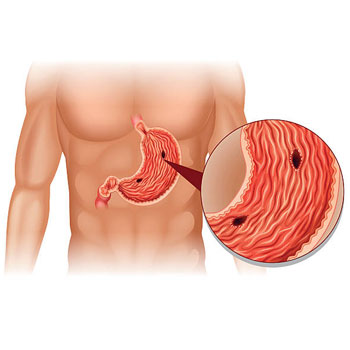What is a peptic ulcer or stomach ulcers?
A peptic ulcer refers to a sore or lesion that develops in the lining of the stomach, duodenum, or esophagus. These ulcers typically occur due to an imbalance between stomach acid, an essential component for digestion, and the protective mechanisms of the stomach lining.
Peptic ulcers are a prevalent gastrointestinal condition affecting millions worldwide. Despite their common occurrence, many misconceptions surround them. In this comprehensive guide, we delve into the intricacies of peptic ulcers, exploring their causes, symptoms, and effective treatment options.
What are the causes of stomach ulcers?
- Helicobacter pylori (H. pylori) infection: this bacterium is a primary cause of peptic ulcers, as it weakens the stomach lining's protective mucus, allowing acid to damage the tissue.
- Nonsteroidal Anti-Inflammatory Drugs (NSAIDs): prolonged use of NSAIDs such as aspirin, ibuprofen, and naproxen can irritate the stomach lining, leading to ulcer formation.
- Excessive alcohol consumption: alcohol can erode the stomach lining and increase stomach acid production, contributing to ulcer development.
- Smoking: smoking weakens the protective lining of the stomach, making it more susceptible to damage from acid.

What are peptic ulcer symptoms?
- Abdominal pain: persistent, dull, or burning pain in the abdomen, often occurring between meals or during the night.
- Indigestion: discomfort or bloating after eating, accompanied by a feeling of fullness.
- Nausea and vomiting: some individuals may experience nausea and vomiting, particularly after meals or when the stomach is empty.
- Bleeding: in severe cases, peptic ulcers can cause internal bleeding, leading to dark, tarry stools or vomiting blood.
How are stomach ulcers diagnosed?
To diagnose a peptic ulcer, gastroenterologists in vijayawada may perform various tests, including:
- Endoscopy: a procedure in which a flexible tube with a camera is inserted through the mouth to examine the digestive tract.
- Upper GI series: X-rays taken after drinking a contrast solution to visualize the esophagus, stomach, and duodenum.
- Blood, stool, or breath tests: these tests can detect the presence of H. pylori bacteria or signs of internal bleeding.
What are the best treatment options for stomach ulcers in vijayawada?
- Antibiotics: if an H. pylori infection is present, a combination of antibiotics and acid-reducing medications is prescribed to eradicate the bacteria.
- Proton Pump Inhibitors (PPIs): these medications reduce stomach acid production, allowing the ulcer to heal.
- H2 receptor antagonists: another class of drugs that decreases stomach acid production, promoting ulcer healing.
- Antacids: over-the-counter antacids provide temporary relief from ulcer symptoms by neutralizing stomach acid.
What are the lifestyle habits that prevent peptic ulcers?
- Avoid trigger foods: spicy, acidic, or fatty foods can exacerbate ulcer symptoms and should be avoided.
- Limit NSAID use: if possible, reduce or eliminate the use of NSAIDs to prevent further irritation to the stomach lining.
- Quit smoking and limit alcohol: quitting smoking and reducing alcohol consumption can help promote ulcer healing and prevent recurrence.
Peptic ulcers can significantly impact an individual's quality of life if left untreated. However, with prompt diagnosis and appropriate treatment, most ulcers can heal effectively. By understanding the causes, symptoms, and treatment options for peptic ulcers, individuals can take proactive steps to manage this condition and prevent complications. Always consult the best gastroenterologist doctor in vijayawada for personalized advice and treatment recommendations for peptic ulcers or stomach ulcers.
Dr. Veera Abhinav Chinta offers the best stomach ulcer treatment and expertise in gastroenterology in vijayawada.
